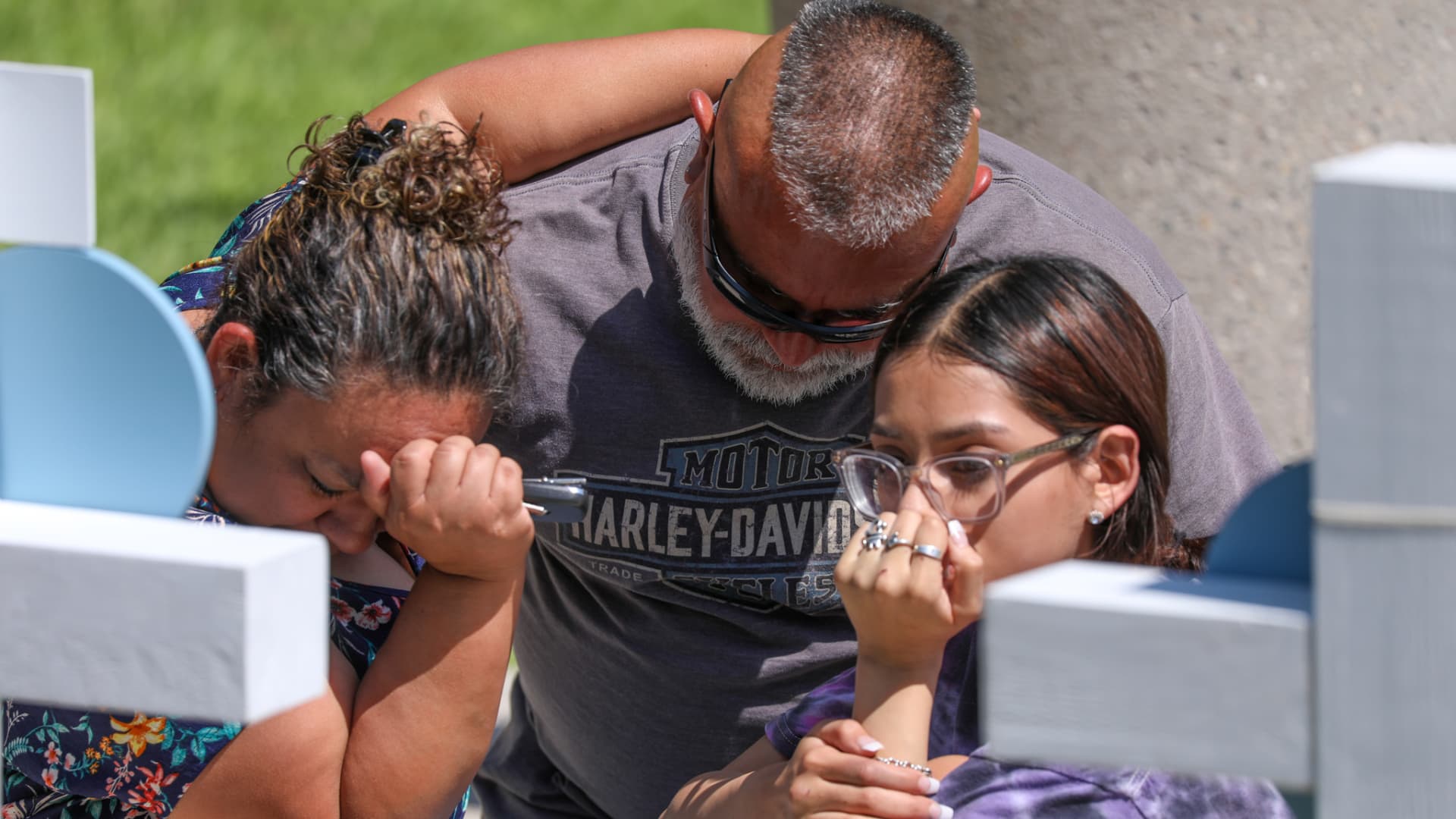Mourners visit a memorial for a victims of Tuesday’s mass shooting at an elementary school, in City of Uvalde Town Square on May 26, 2022 in Uvalde, Texas.
Yasin Ozturk | Anadolu Agency | Getty Images
President Joe Biden tried to comfort families in the south Texas town of Uvalde on Sunday after the nation’s deadliest school shooting in a decade as federal officials announced they would review local law enforcement’s slow response to the attack.
Anger has mounted over the decision by law enforcement agencies in Uvalde to allow the shooter to remain in a classroom for nearly an hour while officers waited in the hallway and children inside the room made panicked 911 calls for help.
The president and first lady Jill Biden wiped away tears as they visited memorials at the Robb Elementary School where the gunman killed 19 students and two teachers, laying white roses and paying respects to makeshift shrines to the victims.
“Do something,” a crowd chanted outside Sacred Heart Catholic Church as Biden exited after attending mass.
“We will,” he answered.
The Bidens are also visiting with victims’ families and survivors for several hours before later meeting with first responders.
Police say the gunman, 18-year-old Salvador Ramos, entered the school on Tuesday with an AR-15 semi-automatic rifle after earlier shooting his grandmother, who survived.
Official accounts of how police responded to the shooting have flip-flopped wildly. The U.S. Department of Justice on Sunday said it would review local law enforcement response at the request of Uvalde Mayor Don McLaughlin.
“I feel sorry for them because they have to live with that mistake of just standing by,” Julian Moreno, a former pastor at Primera Iglesia Bautista and great-grandfather of one of the girls killed, said of Uvalde’s police.
The Uvalde shooting has once again put gun control at the top of the nation’s agenda, months ahead of the November midterm elections, with supporters of stronger gun laws arguing that the latest bloodshed represents a tipping point.
Biden, a Democrat, has repeatedly called for major reforms to America’s gun laws but has been powerless to stop mass shootings or convince Republicans that stricter controls could stem the carnage.
‘We need help’
The Texas visit is Biden’s third presidential trip to a mass shooting site, including earlier this month when he visited Buffalo, New York, after a gunman killed 10 Black people in a Saturday afternoon attack at a grocery store.
Biden was accompanied on Sunday by Texas Governor Greg Abbott, a Republican who opposes new gun restrictions, and other local officials.
“We need help, Governor Abbott,” some in the crowd yelled as Biden arrived at the school. “Shame on you, Abbott.”
Others shouted thanks to Biden as he arrived at the school.
Asked if she had a message for Biden, 11-year-old Bella Barboza, who was friends with one of the victims, said she was now scared to go to school and urged change.
“This world is not a good place for children to grow up in,” she said.
Ben Gonzalez, a life-long Uvalde resident and father of four, was among those at the school memorial site on Sunday calling on leaders to help and saying Democrats and Republicans need to work together.
“Yes, we need new gun laws. But we also need a focus on mental health. There is not just one answer to this problem,” he told Reuters.
White House aides and close allies say Biden is unlikely to wade into specific policy proposals or take executive action on firearms to avoid disrupting delicate negotiations in the divided Senate.
Democrats in the Senate also dialed down the rhetoric as negotiations continued during the chamber’s Memorial Day holiday recess this week.
“We’ve got to be realistic about what we can achieve,” Senate Judiciary Chairman Dick Durbin told CNN’s “State of the Union” program on Sunday. Durbin’s fellow Democrats narrowly control the 50-50 split Senate but need 60 votes to pass most legislation.
Leading Republicans like U.S. Senator Ted Cruz of Texas, former President Donald Trump and Abbott have rejected calls for new gun control measures and instead suggested investing in mental health care or tightening school security.
Ramos, a high school dropout, had no criminal record and no history of mental illness but had posted threatening messages on social media.





































































